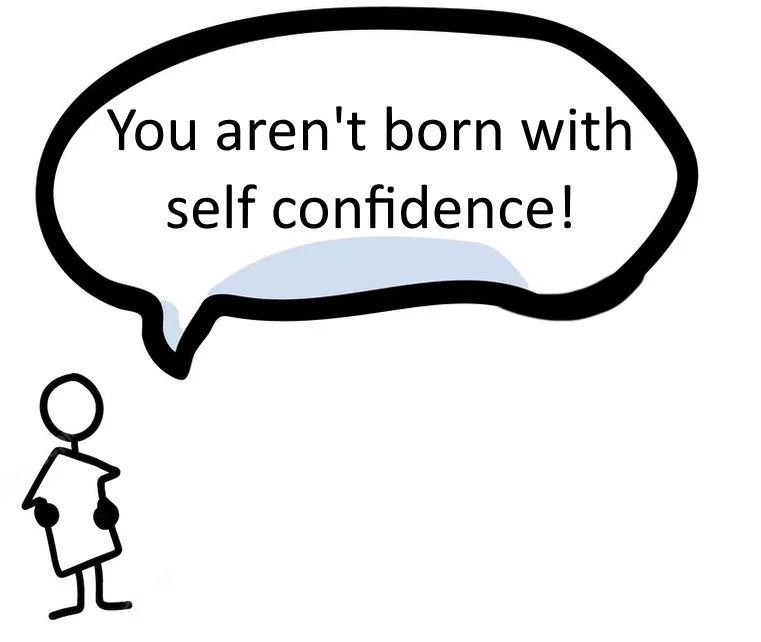
Resilience: The Benefits Of Building Self-Confidence
Self-confidence affects all areas of life.
Without it, people struggle to make significant progress in all areas of their life.
It has a cascading effect on all aspects of our daily life.
And it is also a key building block of resilience that we cover in our resilience training!
For example, it directly affects resilience, which is the ability to bounce back from setbacks. If you’re not confident you can get through something, the chances are that you won’t even try.
If you have learned that you are resilient and can overcome problems, the odds are that you will be.
The opposite is also true. A strong belief in yourself about achieving something actually increases the chances that you’ll do it and do it well.
In an increasingly complex and unpredictable world, being confident that you will be able to overcome emerging issues is often the difference between progress and stagnation.
So, how do you develop self-confidence? What is it anyway? Are you born with self-confidence, or is it something you can develop?
We explore the answers to these and more questions below.
What Is Self-Confidence?
Self-confidence is a general view of how likely you are to accomplish a task or goal based on past experiences.
According to psychologist Albert Bandura, “self-confidence is the belief in one’s capabilities to organize and execute the courses of action required to manage prospective situations.”
How you perceive your skills, abilities, and judgment obviously affects your self-belief and so your view on how likely you are to succeed at any given task.
The benefits of self-confidence are shown across the board.
- Better performance at work
- An openness to try new things
- Increased resilience and grit
- Better interpersonal relationships and mental health
- Increased happiness, sense of well-being
Need to know exactly what resilience is before we continue? Read our article on the definition of resilience here!
What’s The Difference Between Self-Confidence, Self-Efficacy & Self-Esteem?
Unhelpfully lots of people use these terms interchangeably. They actually refer to different things but they’re all closely related.
Self-confidence is your faith in your own abilities.
Self-esteem is your feeling of self-worth. This is not just about your abilities but relates more broadly to your sense of self.
Self-efficacy refers to your belief that you have the capacity and skills to achieve your goals. It is more specific than self-confidence and refers to behaviour.
How Can You Tell If Someone Is Self-Confident?
Self-confident individuals display several unique characteristics that set them apart from others.
These include:
Assertiveness
Self-assured people set and maintain clear boundaries. They know what they want and ring-fence their time and resources to achieve their goals.
Decisiveness
Self-confident people make calculated decisions and follow through when executing them.
Taking risks
Self-confident people take more calculated risks. Why? Because they expect their actions to yield successful outcomes.
Saying “NO”
Self-confident people have mastered the art of gracefully saying “No.” Rejecting unnecessary requests that eat into your time improves your ability to focus on what matters, leading to better control over your time, and your emotional and mental health.
Open body language
People with self-confidence have open and inviting body language. They go through life with their heads held high, and shoulders squared regardless of the challenges in their lives.
Self-confident also tend to be very capable at managing stress!
How Are Resilience & Self-Confidence Linked?
Resilience is the ability to bounce back after challenges or setbacks. Resilient people typically dare to pick up the pieces, learn from their mistakes and move on.
Trying something again when you’ve failed several times requires guts. That’s where self-confidence comes in.
Research shows that self-confident people are more likely to bounce back and that they do so faster after a setback. Their belief in their ability to succeed allows them to do this.
They chalk up failures as learning opportunities and use the lessons to build back bigger and better.
Are You Born With Self-Confidence?
Definitely not!
While genetics play a role in shaping a person’s character, its contribution to confidence is less than you might think.
Self-confidence is earned.
You develop self-confidence. You learn that you can and will overcome problems as you go through life and experience new challenges and situations.
A result of this is that it is known that early childhood experiences have a significant contribution to self-confidence. As a child, you learn that you can overcome problems and keep going.
Can You Have Too Much Self-Confidence?
Yes. You can have too much of a good thing.
Excess self-confidence ultimately tips over into overconfidence.
Overconfidence distorts a person’s abilities and can lead to a number of problems .
- Taking on more than you can handle. Saying ‘Yes’ to projects when you don’t have the time or resources to complete them is inevitably going to cause problems.
- Missed opportunities. If you pass on projects because you feel they fall beneath your abilities, you will miss opportunities to grow and learn.
- Problems with relationships. Overconfidence is often perceived, understandably, as arrogance, with obvious knock-on issues for your reputation and ability to get on with people.
Do You Have Too Much Self-Confidence?
Do you regularly take on more than you can handle?
When you frequently take on too much and fail to deliver, that’s a clear sign of overconfidence.
People with too much self-confidence display other unmistakable traits as well:
- Speak loudly and cut other people off to prove their points, feeling that their point is more important than the points that others want to make.
- They constantly feel dissatisfied with life and their performance, feeling they should have achieved and have more.
Any one of these traits on their own doesn’t say much. However, having more than one may mean it’s worth thinking about this further.
Overconfident people are often resented and disliked. In the short term, they get things done. However, as people often feel coerced into complying rather than going along willingly, this is a short term benefit but a long term problem.
For more resilience tips, read our guide on the relationship between resilience and stress here!
Do You Have Too Little Self-Confidence?
Do you tend to shy away from projects with more responsibilities? If so, it might be a sign that you have low self-confidence.
People with low self-confidence shy away from challenges. Confusingly they also tend to accept whatever is thrown at them without pushing back as they don’t have the confidence to do so.
Other characteristics of people with low self-confidence include:
- Difficulty accepting compliments
- Prioritizing the needs of others before their own.
- Low expectations
- Indecisiveness and hesitancy to take on projects
- Avoiding certain social situations, especially if they challenge your abilities.
- Difficulty maintaining healthy interpersonal relationships.

Boosting your self-confidence can help you to show gratitude!
How Can You Build Your Self-Confidence?
Self-confidence is a learnable skill and comes from four primary sources:
Mastery experiences
Completing a difficult or new task boosts self-confidence and primes you to attempt bigger projects in future.
Social modelling
This is how most people learn in early childhood. Seeing other people similar to you succeed will in turn raise your belief that you can also succeed.
Social persuasion
Receiving encouragement or positive feedback from other people alters your mind’s perspective and allows you to start believing you can achieve a goal.
Psychological responses
Moods, emotions and physical health affect how self-confident you feel. For example, somone who is exhausted is likely to be less confident about taking on a demanding project.
This can even help you to overcome imposter syndrome!
9 Practical Ways To Build Your Self-Confidence
1. Get realistic with yourself
Work from the inside out. For example, when your boss asks if you can handle a particular project, take time to evaluate your skills and current time commitments before you answer.
That way when you answer you’re doing so from a position of having thought things through and so a position of confidence.
2. Don’t compare yourself to others
Comparison destroys self-confidence.
There will always be someone more affluent, more intelligent or more accomplished than you on one area, but remember you don’t know what’s going on in the rest of their life.
If you have to be competitive, make it with yourself. Compare yourself with who you were yesterday. Are you doing better or worse?
Focusing on your growth and how far you have come is a great way to boost your self-confidence.
For more on resilience, check out our resilience statistics here!
3. Take better care of your body
A healthy body does wonders for your self-confidence.
You will feel better and that will show itself in everything that you do.
Following a simple regime of healthy eating and exercise will boost your confidence pretty quickly.
4. Learn and get inspired by your past
If you’ve successfully achieved a goal in the past, then you can do it again.
Make a list of past accomplishments that you are really proud of and keep it close.
Go back to it regularly for inspiration. Remind yourself of the awesome things you’ve done in the past to inspire what you can do now.
If you failed at your goal in the past, what can you learn from it?
This is closely related to point 2 above.
5. Keep trying new and uncomfortable things
Self-confidence is about handling new and uncomfortable situations.
Therefore, doing small things that stretch you every day is a great way to improve your self-confidence.
This can take any form. Strike up a quick conversation with a stranger, try a new hobby. If it makes you feel uncomfortable, even a little, and you do it anyway it’ll help.
6. Dress for confidence
How you dress influences how others perceive you. It also impacts how you perceive yourself.
Research shows that wearing different clothes leads you to think and act differently.
To boost confidence, dress how a confident version of yourself would. Go for clothes that accentuate your best features.
7. Set achievable goals
Setting and achieving goals, even small ones, significantly increases self-confidence.
Your brain will increasingly believe that you can achieve your goals.
As we talked about above, this starts a virtuous cycle of accomplishments and expanding self-confidence.
Setting unrealistic goals can equally lead to a vicious cycle of failure and reducing self-confidence.
8. Practice positive self-talk
Positive self-talk if a product of positive thinking. It fosters self-compassion and the ability to take on new challenges.
For example, instead of telling yourself, “This is impossible,” or “I can’t do this,” rephrase it into “I can do this” and “Anything is possible if I set my mind to it.”.
Remember you don’t ‘have’ to do anything. You ‘get’ to do something.
9. Correct your posture
This might feel silly at first, but posture affects how you feel about yourself. Try power poses that can alter your frame of mind.
According to research by Ohio State University, sitting up straight can help you feel more self-confident about the task at hand.
Conclusion
Self-confidence improves every aspect of a person’s life, but it is earned.
With it, you can accomplish more at work, improve relationships and, more importantly, improve health and well-being. Use the tips above to foster and develop yours.
Are you a manger that wants to learn more about workplace resilience? Read our guide to boosting workplace resilience here!
Image Credits: Pexels


